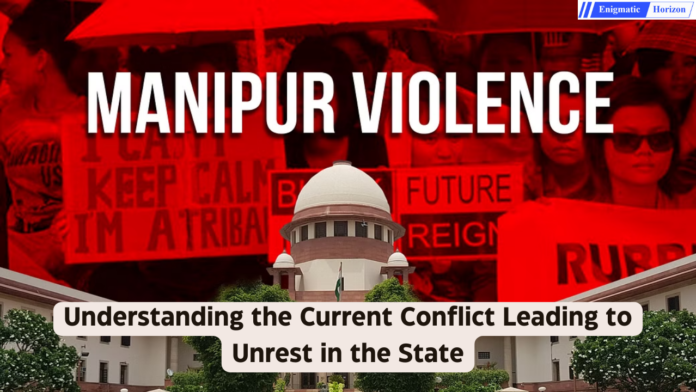Rinku Sharma
For almost two months, severe violence has raged in the northeastern state of Manipur. The deadly ethnic clash that broke out between the Meitei and Kuki local ethnic communities has resulted in extensive violence, with over 100 fatalities and over 35,000 displacements in the state.
The state administration has imposed military curfews, shut down internet access, and deployed troops and paramilitary forces into the state to quell the unrest. However, the situation does not seem to be improving even after this.
The latest violence in Manipur is being blamed on a High Court decision. On May 3, the Manipur High Court mandated that the government implement a 10-year-old recommendation to include the Meitei community, a non-tribal group, in the tribe. Violence erupted between the Kuki community residing in the hilly areas and the Meitei community living in the Imphal Valley as a result of this High Court judgement. The violence broke out at a rally in Churachandpur demanding ST status for the Meiteis.
Manipur’s population originates from a number of ethnic groups, including Meitei, Naga, Kuki, and others. Meities account for roughly 53% of the population. The Imphal Valley is home to the majority of Meiteis. The Naga and Kuki tribes are predominant in Manipur’s hill areas, constituting another 40 percent of the population.
Since 2012, the Schedule Tribe Demand Committee of Manipur has been petitioning for the grant of tribe status to the Meitei population, arguing that the Meitei possessed such status prior to Manipur’s merging with India in the year 1949.
The Kukis are opposed to the Meiteis receiving ST status, as they claim that if the Meitei group is granted reservations, they will essentially take over the entire reservation, depriving the Kukis of access to government employment and educational opportunities. On the other hand, the Meitei caste claims that by establishing settlements, the Kukis are encroaching on the protected forest areas.
Significant numbers of people have died and been injured as a result of the ethnic conflict between the Meitei and Kuki populations in the violence-hit northeastern state. Protesting mobs have set ablaze schools, homes, churches, government buildings, and commercial properties. After nearly two months of violence, although the situation appears to be under control, angry mobs are still protesting in some places.
Home Minister Amit Shah recently travelled to Manipur in an effort to put an end to the violence, which has been going on for almost two months. Shah stated that the central government would be looking into the incident through a judicial investigation. He also announced the formation of a committee for peace between members of various communities.
Manipur Chief Minister N. Biren Singh, who was considering resigning from his post out of concern for the public’s lack of trust in him, later changed his mind after witnessing the outpouring of support. On May 1, Singh told news agency ANI that it was not possible to confirm or deny an international hand in the ongoing ethnic hostilities in the state between the Meitei and Kuki communities, but it seemed pre-planned.
After receiving an update from Home Minister Amit Shah, Prime Minister Narendra Modi presided over a high-level meeting while the situation in the northeastern state remained unstable. During this time, N. Biren Singh also met with Amit Shah in Delhi to discuss the evolving situation in the violent state. After the meeting, Singh tweeted that the central government has assured to take all possible steps to restore normalcy to Manipur. The chief minister further tweeted that the home minister also advised the state government to intensify efforts to bring about enduring peace and requested the support of all Manipur stakeholders to ensure that the state is free from all conflict.
Prioritizing the return to normalcy and ending intercommunity violence is the need of the hour at this time of ethnic violence gripping Manipur. An environment must be established where all parties involved in the disagreement can come together and find a solution. There must be structural governmental adjustments that are advantageous for the entire community and accepted by all stakeholders associated with the conflict.
